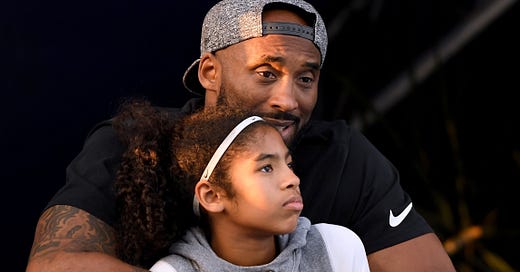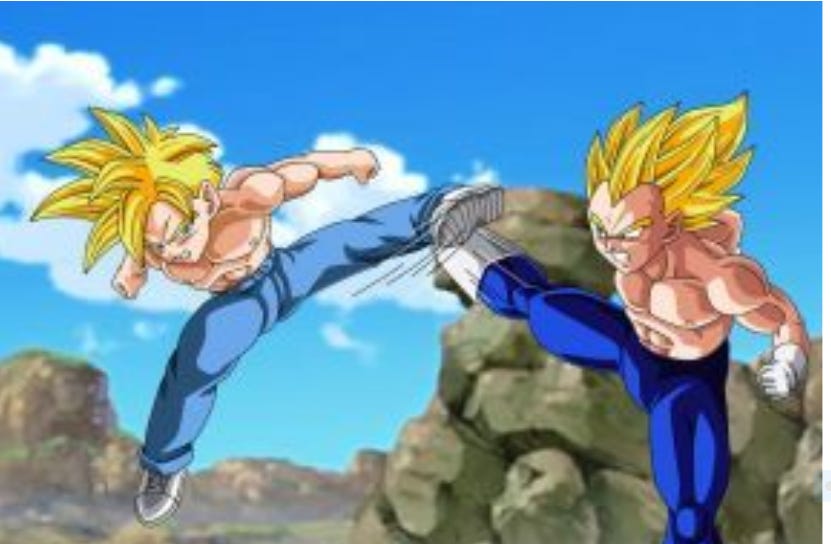Hi all.
If you're like me, the shocking deaths of Kobe Bryant, his daughter Gianna, and the seven other individuals in the helicopter crash on Sunday have been weighing heavily on your mind lately.
I spent most of the past 48 hours by reading touching obituaries and listening to harrowing podcast episodes from my favorite NBA writers, and continue to feel a wave of uneasiness each time the ticker on the bottom of ESPN states:
"Kobe Bryant died in a helicopter crash Sunday morning. He was 41".
So matter-of-factly.
As if that's as inconsequential a piece of trivia as the box score that follows it.
Having only started following the NBA during the 2007-08 season, I don't have a personal connection to, nor memory of, the majority of his notable #8 moments - the lob to Shaq vs. Portland, his sexual assault case, the 81-point game.
Instead, I was in my bedroom, probably engrossed in Dragon Ball Z manga while my brother and dad watched in our living room.
My introduction to Kobe was in the 2008 Playoffs. I came into the Western Conference Finals series already rooting against him because the Lakers were playing my favorite team, the San Antonio Spurs.
I liked the Spurs because they had my favorite player, Manu Ginobili, and hated the Lakers because my dad thought Kobe was a ball-hogging, Jordan-wannabe. Plus, my favorite sportswriter Bill Simmons was a die-hard Celtics fan, and his writing often encouraged me to focus on the flaws in Kobe's game rather than his achievements.
Like anyone who parrots the opinions of those they look up to, these sentiments polluted my perception of Kobe before watching a single minute of him play basketball. In turn, most of my memories of him on the court - other than his unbelievably on-brand last game - accumulated into a general lack of appreciation for his playing style, and for how his mentality inspired so many people.
The Bulls fan in me thought it was borderline disrespectful how Kobe was ever mentioned in the same breath as Michael. That Kobe modeled his competitive nature, his relentless work ethic - and even his movement and speech patterns - after Jordan's seemed, to my mind, the end of any proverbial barbershop debate.
But I think one reason Kobe's passing carries such a deep resonance is that he seemed to be actively defying Harvey Dent's famous quote from The Dark Knight:
His career after retiring from basketball gradually counterbalanced my negative perception of him from his playing days.
I saw him as a man constantly trying to better himself when he recognized he was in the wrong. As a proud "Girl Dad" and champion of Women's Basketball. And as an unconventionally generous old-head who didn't sit around criticizing the current generation of basketball stars, but instead tweeted motivational challenges to players that he recognized as being capable of achieving a higher level of performance.
See, I used to agree with the pundits who felt everything Kobe did was "calculated", much in the way that Hillary Clinton or Taylor Swift are similarly criticized by the media. But we only label others as "calculated" when they unconvincingly portray the role their celebrity demands, or when their actions come across as dishonest.
I recall thinking at the time that his farewell "Mamba Out" speech felt 'rehearsed'. Even though I ended up being right - "Mamba Out" merch was made available on his website moments after his mic drop - I'm starting to reconsider if that's a valid criticism of anybody anymore, let alone Kobe.
In the age of social media, everything feels "calculated". If thousands of people debated your every action, dozens of cameras flashed every time you sat down for dinner, and swarms of reporters distorted your every word to fit their version of your story, you'd probably meticulously craft everything you said and did, too.
If you're a millennial with some combination of active Twitter, Instagram, LinkedIn, and Snapchat accounts, you might already be doing this.
When thinking about what Kobe means to his fans, two quotes come to mind:
The first:
"A failure to prepare is preparing to fail”
The second:
"Luck occurs when opportunity meets preparation"
Kobe actually practiced those audacious shots he took.
Meanwhile, his fans saw the game-winning jump shot and its accompanying glory, and sprinted out to their driveways to replicate his fade-away for themselves.
They temporarily borrowed his self-esteem when stepping onto their nearest court, and subconsciously assumed his unwavering confidence as they laced up his sneakers.
What the average fan didn't see were the tens of thousands of shots he put up at the gym, putting in work at 3:00 AM, while everyone else was fast asleep.
Another reason calling Kobe "calculated" is a bit ironic: he was abhorred by the NBA analytics community. Sports columnists routinely called him inefficient, a chucker, said he took too many bad shots, etc.
And so Kobe represented the clash between the "head" of calculable statistics, and the "heart" of every jacked, 5'6'' Kobe fan at your local LA Fitness who genuinely believes his next 30-footer is going in, even though everyone on the court knows he's never practiced that shot before.
But future NBA players noticed the subtext of those game winners.
That's why, even in 2020, many NBA players still declare Kobe their biggest inspiration and favorite player. They, too, had put in the work.
Maybe not to Kobe's maniacal extent, but they recognized the amount of effort and preparation that went into what most people only observed as a singular moment.
When you watch NBA basketball, you're watching players who went through years of shooting drills, of overcoming adversity, and of taking one last shot on the driveway before it got too dark outside to see.
I'm reminded of when Kanye once said, "If you're a fan of Kanye West, you're a fan of yourself". Kobe fans might be an even better example of a fandom's undying devotion to their messenger of faith. Their Kobe apparel are as much an extension of their personality as are a Kanye fan's latest Yeezy's.
I mentioned earlier that while everyone else was watching #8-Era Kobe, I was reading Dragon Ball Z comics.
The reason I mentioned this is because, in hindsight, Kobe's career arc reminds me a lot of Vegeta's character development in the Saiyan and Cell Sagas (which generally means Seasons 1 and 2, for those unfamiliar).
The Prince of all Saiyans, Vegeta starts off as DBZ's first arch-nemesis to Goku, who had been the show's hero and unquestionable protagonist since its prequel series, Dragon Ball. Vegeta is envious of Goku's ability to become a Super Saiyan (the DBZ equivalent of the G.O.A.T.) at the end of the Saiyan Saga, when Goku defeats the evil Lord Frieza. Ruthlessly obsessed with greatness, and determined to reach this ultimate form, Vegeta locks himself in a training room with increased gravity that worked thusly: Each day that passed in real life was equivalent to a year in the training chamber. When Vegeta emerged, after putting in several weeks (that were for him, decades) of rigorous training, he was still not yet a Super Saiyan.
The ensuing Cell Saga begins with an unknown warrior saving all of Goku's friends from Frieza, who turns out to have survived, and has returned with his father, King Cold, among several other imposing villains.
The warrior, we later learn, is Vegeta's son, who had traveled from the future because he knew everyone was about to be in grave danger. Vegeta understood how precious his time was, how badly he wanted to be the best at what he did, and was determined to spend all of his time towards chasing after the greatest warrior of his time, Goku.
But once he became a father, something about his temperament changed. He started training with the future version of his son, bringing him to the time chamber, and wouldn't you know it, Vegeta became a Super Saiyan shortly thereafter.
This is what devastates me so much about Gianna's passing.
What humanized Kobe, for me at least, was how he incorporated his "Mamba Mentality" into his life outside of basketball, specifically as a parent.
Once Kobe became a father, his actions seemed more believable, less "calculated".
According to the obituaries, Kobe raved about Gigi to anyone who would listen. She had that same "it" gene. She was going to be his successor, the Super Saiyan of the WNBA. And it hurts me so much to think about how they were on their way to his basketball camp - his version of Vegeta's training facility, when they crashed.
On his way to personally motivate Gigi (and countless others) into becoming an even better basketball player - and person - than he ever was.
"Luck occurs when opportunity meets preparation"
And so I think a better word for describing Kobe, rather than "calculated", is that he was prepared.
He embodied the phrase, "hard work pays off", and left as little to chance as possible.
This is what separated him from your local LA Fitness hooper.
When the guy in sweatpants hits a logic-defying game winner, you shake your head, sigh, and chalk it up to bad luck. "Lucky shot", your teammate might say to you, if you were the one guarding him when the ball rattled around the rim and fell through.
You knew this dude had never put in the work like you had, and so all you could do was begrudgingly shake hands afterwards.
But nobody rolled their eyes at any of Kobe's 81 points vs. Toronto. No announcer said "lucky bounce" when Kobe buried the Suns in 2010 with a flurry of impossible shots. No one thought those last two free throws to get 60 vs. Utah were due to chance.
They served as decades of preparation being granted one, final opportunity.
Because if I learned anything this weekend, it's that Kobe Bryant was not lucky.
And we were not prepared.
Poem: "Walk a little slower, Daddy"
"Walk a little slower, Daddy!", said a little child so small.
"I'm following in your footsteps and I don't want to fall.
Sometimes your steps are very fast, sometimes they're hard to see;
So walk a little slower Daddy, for you are leading me.
Someday when I'm all grown up, you're what I want to be.
Then I will have a little child who'll want to follow me.
And I would want to lead just right, and know that I was true;
So, walk a little slower, Daddy, for I must follow you!"







